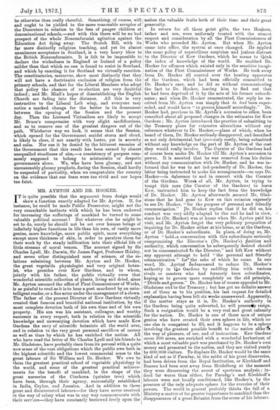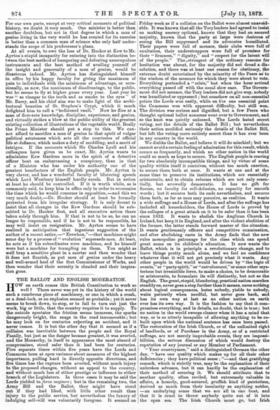MR. AYRTON AND DR. HOOKER.
TT is quite possible that the argument from design would
show a function exactly adapted for Mr. Ayrton. If, for instance, he could be made Public Prosecutor, might not the very remarkable instincts with which he has been endowed for increasing the sufferings of mankind be turned to some valuable political account ? But whatever else he might be set to do, surely he should not be set over human beings of infinitely higher functions in life than his own, of vastly more genius, more knowledge, more public spirit, more everything except more thickness of skin, in order to paralyse them for their work by the steady infiltration into their official life of little streams of moral venom. The account signed by Sir Charles Lyell, Mr. Darwin, Sir James Paget, Professor Huxley, and seven other distinguished men of science,- of the re- lations subsisting between Mr. Ayrton and Dr. Hooker, the great vegetable physiologist and very original botan- ist, who presides over Kew Gardens, and to whom, jointly with his father, the public virtually owes that wonderful scientific collection of plants, living and dried, since Mr. Ayrton assumed the office of First Commissioner of Works, is as painful to read as it is to hear a poet murdered by an unin- telligent reader, or a fine actor under the management of a clown. The father of the present Director of Kew Gardens virtually created that famous and beautiful national institution, by the most complete devotion both of his own time and of his own property. His son was his assistant, colleague, and worthy successor in every respect, both in relation to the scientific knowledge and unwearying devotion which have made Kew Gardens the envy of scientific botanists all the world over, and in relation to the very great personal sacrifices of money as well as time by which he has enriched the nation. All who have read the letter of Sir Charles Lyell and his friends to Mr. Gladstone, have probably risen from its perusal with a quite new sense of the vast obligations which the public owe both in the highest scientific and the lowest commercial sense to the great labours of Sir William and Dr. Hooker. We owe to them the greatest practical school of vegetable physiology in the world, and some of the greatest practical achieve- ments for the benefit of mankind, in the shape of the great nurseries of the Cinchona (quinine tree) which have been, through their agency, successfully established in India, Ceylon, and Jamaica. And in addition to these great and disinterested labours—for they have never received in the way of salary what was in any way commensurate with their serv'..ces—they have constantly bestowed freely upon the
nation the valuable fruits both of their time and their great generosity.
In return for all these great gifts, the two Hookers, father and son, were uniformly treated with the utmost respect and consideration by all the First Commissioners of Works who preceded Mr. Ayrton. But when Mr. Ayrton came into office, the system at once changed. He applied the same policy of supercilious suspicion and jealous distrust to the Director of Kew Gardens, which he seems to tlaink the index of knowledge of the world. He snubbed Dr. Hooker for offences which existed only in the sensitive imagi- nation of the First Commissioner of Works. He took away from Dr. Hooker all control over the heating apparatus of the Gardens, which had been officially committed to Dr. Hooker's care, and he did so without communicating the fact to Dr. Hooker, leaving him to find out that he had been deprived of it by the acts of his former. subordi- nates; and when Dr. Hooker remonstrated, the reply he re- ceived from Mr. Ayrton was simply that he had been super- seded, and would have "to govern himself accordingly." Dr. Hooker had, previous to Mr. Ayran's accession to office, been consulted about all proposed changes in the estimates for Kew Gardens ; Mr. Ayrton introduced the practice of submitting to the Treasury plans for extensive alterations without any reference whatever to Dr. Hooker,----plans of which, when he heard of them, Dr. Hooker seribusly disapproved, and described as not only detrimental, but ignorantly costly, being submitted without any knowledge on the part of Mr. Ayrton of the cost they would really involve. The Curator of the Gardens had of course been under Dr. Hooker till Mr. Ayrton's accession to power. It is asserted that he was removed from his duties without any communication with Dr. Hooker, and he was in- formed that he was to act independently of Dr. Hooker, the latter being instructed to make his arrangements—so says Dr. Hooker—in deference to and in concert with the Curator of the Gardens. Worst- of all, Mr. Ayrton, in trying to tempt this man (the Curator of the Gardens) to leave Kew, instructed him to keep the fact from the knowledge of Dr. Hooker. Mr. Ayrton afterwards Assured Mr; Glad- stone that he had gone to Kew on this occasion expressly to see Dr. Hooker, "for the purpose of personal and friendly communication." pr. Hooker replies that if he did so, his conduct was very oddly adapted to the end he had in view, since he (Dr. Hooker) was at home when Mr. Ayrton paid his visit, and Mr. .Ayrton forgot the very prdinary preeaution of inquiring for Dr. Hooker either at his home, or a the Gardens, or of Dr. Hooker's subordinate. In place, of doing so, Mr. Ayrton "held .a conversation with this subordinate seriously compromising the Director's (Dr. Hooker's) Position and authority, which conversation he subsequently desired should not be communicated to the Director," and left Kew without any apparent attempt to hold "the personal and friendly ceramunication " for' the sake of which he came. In one word, Mr. 4yrteri gndeavoured to reduce Dr. Hooker's authority in tjae Gardens by saddling him with various rivals, or masters who had formerly been subordinates, hoping so to govern • more completely on the old principle, "Divide and govern." Dr. Hooker has of course appealed to Mr. Gladstone and to the Treasury ; but has got no definite answer out of 'them' as to his position, his last request for detailed explanation having been left six weeks unanswered. Apparently, if the matter stays as it is, Dr. Hooker's authority in the Gardens being quite subverted, he will presently resign.
Such a resignation would be a very real and great calamity for the nation. Dr. Hooker is one of those men of unique genius who have created their own sphere in life, which no one else is competent to fill, and it happens to be a sphere involving the greatest possible benefit to the nation alikelis the way of pleasure, of use, and of instruction. Kew Gardens cover 300 acres, are enriched with a wonderful herbarium', of which a most valuable part- was purchased by Dr. Hooker's own money and presented to the nation, and they are visited yearly by 600,000 visitors. To displaee Dr. Hooker would be the same kind of act as if Faraday, in the midst of his great discoveries, had been driven from the Royal Institution, or Kirchhoff and Bunsen had been sent away from Heidelberg at the moment they were discovering the secret of spectrum analysis ; in- deed far worse than either, for Faraday's and Kirchhoff's labours were not locally conditioned, like Hooker's, by the presence of the only adequate sphere for the exercise of their powers. The world in general probably thinks the fall of a Ministry a matter of far greater importance to mankind than the disappearance of a great Botanist from the scene of his labours. For our own parts, except at very critical moments of political history, we doubt it very much. One minister is better than another doubtless, but not in that degree in which a man of genius living in the very world he has created for its exercise is better than a common man of science who only half under- stands the scope of his predecessor's plans.
At all events, to owe the loss of Dr. Hooker at Kew to Mr. Ayrton's stupid incapacity for entering into the distinction be- tween the best method of hampering and defeating unscrupulous instruments and the best method of availing yourself of the insight and generosity of a man of genius, would be disastrous indeed. Mr. Ayrton has distinguished himself in office by his happy faculty for giving the maximum of pain to individuals with the minimum of advantage, or occa- sionally, as now, the maximum of disadvantage, to the public, but he seems to fly at higher game every year. Last year he was " as vinegar to the teeth and as smoke to the eyes" of Mr. Barry, and his chief aim was to make light of the archi- tectural beauties of St. Stephen's Crypt, which it much 'delighted him to call a "bedizened vault." Now he flies at a man of first-rate knowledge, discipline, experience, and genius, and virtually strikes a blow at the public utility of the greatest existing collection of illustrations of the vegetable world. Really the Prime Minister should put a stop to this. We can- not afford to sacrifice a man of genius to that spirit of vulgar political astuteness which sets all the courtesies of official life at defiance, which makes a duty of meddling, and a merit of intrigue. If the accounts which Sir Charles Lyell and his colleagues have given us be exact, Mr. Ayrton wants to administer Kew Gardens more in the spirit of a detective officer bent on embarrassing a conspiracy, than in that of a Minister who has under his authority one of the greatest benefactors of the English people. Mr. Ayrton is very clever, and has a wonderful faculty of blistering speech which Lord Westbury himself hardly excels. But in action at least he should be controlled. If it is worth while, as is 'commonly said, to keep him in office only in order to economise the time which he would consume in opposition,—and this we very much doubt,—Dr. Hooker should at least be formally protected from his irregular strategy. It is only decent to insist that all changes in the Kew Gardens should be sub- mitted to Dr. Hooker first, and all executive action there taken solely through him. If that is not to be so, he can no longer be responsible, and if he is not to be responsible, he may well insist on resignation. Mr. Ayrton seems to have realized in anticipation that ingenious suggestion of the author of a recent satire,—" Erewhon,"—that machines might some day by a process of "evolution " supersede men. At least, he acts as if his subordinates were machines, and he himself were but a machine for trampling on them. You might as well bray a sensitive plant in a mortar and then wonder that it does not flourish, as put men of genies under the heavy and well-armed heel of the first Commissioner of Works, and then wonder that their serenity is clouded and their inspira- tion gone.



































 Previous page
Previous page